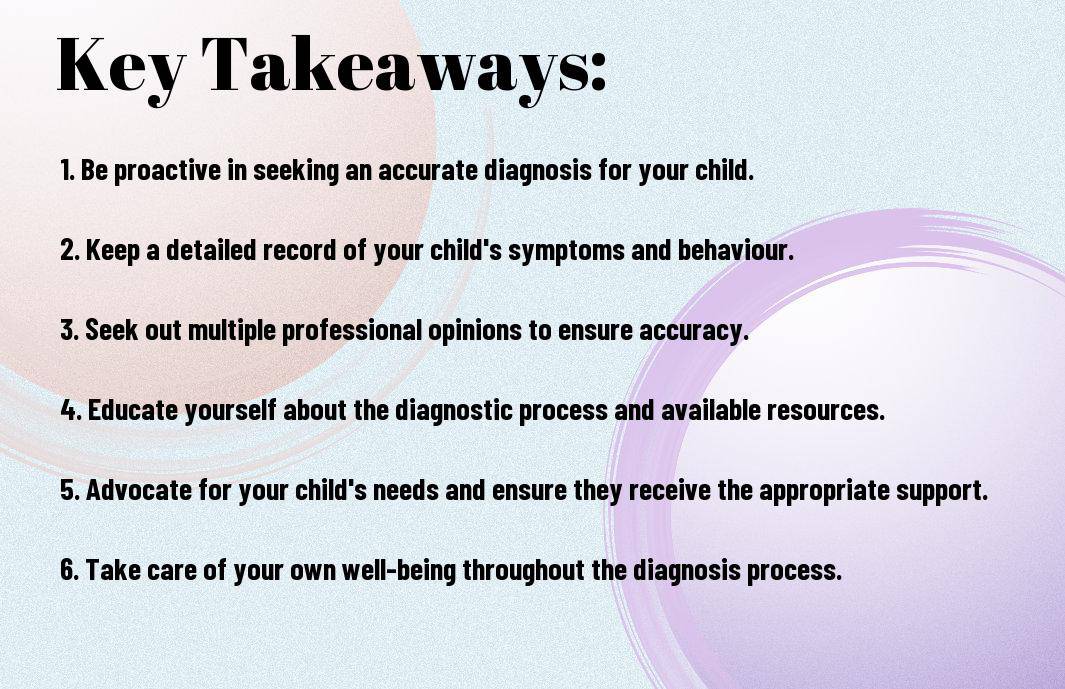Obtaining a diagnosis for your child can be a daunting and overwhelming task. It is crucial for parents to be well-informed and proactive throughout this process in order to ensure the best possible outcome for their child. From recognising early warning signs to finding the right healthcare professionals, this blog post will provide parents with valuable guidance on navigating the diagnosis process. We will discuss the importance of early intervention, the potential risks of delayed diagnosis, and offer practical tips for seeking the right support. With the right knowledge and approach, you can empower yourself as a parent and advocate for your child’s wellbeing during the diagnosis process.
Key Takeaways:
- Education: It is important for parents to educate themselves about the diagnosis process, including understanding the different steps involved and the potential outcomes.
- Advocacy: Parents play a crucial role in advocating for their child during the diagnosis process, including communicating effectively with healthcare professionals and seeking out appropriate resources and support.
- Empowerment: Navigating the diagnosis process can be overwhelming, but it is important for parents to empower themselves by staying informed, seeking second opinions if necessary, and trusting their instincts about their child’s needs.

Preparing for the Doctor’s Visit
When preparing for a doctor’s visit to discuss concerns about your child’s health, it’s important to be well-prepared and organised. This will ensure that you make the most out of the appointment and provide the doctor with all the necessary information.
Gathering Relevant Medical History
Before the appointment, gather all relevant medical history of your child. This includes previous illnesses, surgeries, hospitalisations, and any chronic conditions. It’s also helpful to have a list of current medications and any allergies your child may have. Having a clear and concise summary of your child’s medical history will assist the doctor in understanding the overall picture of your child’s health and may help in the diagnostic process.
Documenting Symptoms and Concerns
It is important to document any symptoms and concerns you have noticed in your child. Take note of the frequency, duration, and severity of the symptoms, as well as any triggers or alleviating factors. This information will assist the doctor in identifying patterns and potential root causes of the symptoms.
In addition to documenting physical symptoms, note any changes in behaviour, mood, or developmental milestones. These details can provide valuable insights for the doctor in understanding the holistic health of your child.
Navigating Medical Assessments
When it comes to navigating the diagnosis process for your child, Diagnosis Discussion Tips for Parents can be incredibly helpful.
Types of Diagnostic Testing
There are various types of diagnostic testing that may be recommended for your child, including developmental and behavioural assessments, medical history reviews, and observation sessions. The process may also involve screening for genetic disorders, blood tests, cognitive testing, and imaging tests such as MRI or EEG. The information gathered from these assessments will help in determining whether your child meets the criteria for a diagnosis of autism spectrum disorder (ASD).
| Developmental and behavioural assessments | Medical history reviews |
| Observation sessions | Screening for genetic disorders |
| Blood tests | Cognitive testing |
| Imaging tests such as MRI or EEG |
Interpreting Results and Seeking Second Opinions
After undergoing various types of diagnostic testing, interpreting the results can be complex and overwhelming. It’s essential to seek second opinions from experienced professionals to ensure an accurate diagnosis for your child. Seeking a second opinion can provide you with peace of mind and a clearer understanding of the next steps in your child’s journey.
It’s crucial to remember that interpreting results and seeking second opinions are essential steps in the diagnosis process for your child. Do not hesitate to advocate for your child’s needs and seek as much information and support as possible.

Engaging with Specialists
The Role of Pediatric Specialists
When navigating the diagnosis process for your child, engaging with paediatric specialists is crucial. These medical professionals are specially trained to diagnose and treat children’s health conditions, and their expertise is invaluable in identifying and addressing any potential concerns with your child’s health. They play a vital role in the diagnostic process, and their insights can provide you with a better understanding of your child’s condition.
Coordinating Care Among Various Health Professionals
Coordinating care among various health professionals is essential when seeking a diagnosis for your child. Paediatric specialists often work alongside other healthcare providers, such as therapists, educators, and support staff, to ensure that your child receives the comprehensive care they need. By collaborating with a diverse team of professionals, you can access a range of expertise and support for your child, and address any challenges they may face.
It’s important to maintain clear communication between all healthcare professionals involved in your child’s care. This can help to ensure that their needs are fully addressed and that any recommendations or treatments are aligned across the board.
Advocating for Your Child
As a parent, it is crucial to advocate for your child throughout the diagnosis process. Be proactive in seeking the best possible care and information for your child’s needs. This may involve researching different healthcare providers, asking for second opinions, and ensuring that your child’s voice is heard throughout the process.
Communication Strategies with Healthcare Providers
When communicating with healthcare providers, clearly express your concerns and observations about your child’s symptoms. It is important to ask questions and seek clarification if there is anything you do not understand. Keep a record of all discussions and appointments to ensure that you have a comprehensive understanding of your child’s diagnosis and treatment options.
Building a Support Network
Building a support network is essential for parents navigating the diagnosis process. Seek out support groups for parents of children with similar diagnoses and connect with other families who have been through similar experiences. Reach out to trusted friends and family members who can provide emotional support and practical assistance during this challenging time.
It is important to remember that you are not alone in this journey. Building a support network will provide a sense of community and understanding, and help alleviate feelings of isolation that often come with navigating a child’s diagnosis.
Managing Insurance and Financial Aspects
Understanding Insurance Coverage for Diagnostic Procedures
When your child is undergoing the diagnosis process, it is crucial to understand your insurance coverage for diagnostic procedures. Consult your insurance provider to determine which diagnostic tests and evaluation services are covered under your policy. Be aware that certain tests or specialist consultations may require pre-authorization from your insurance provider. It’s important to stay informed about the potential financial implications of each diagnostic procedure to avoid any unexpected out-of-pocket expenses.
Additionally, familiarise yourself with any limitations or exclusions in your insurance coverage, especially pertaining to pre-existing conditions or specific diagnostic tests. Take note of any co-pays, deductibles, and maximum coverage amounts for diagnostic services. Understanding your insurance coverage will empower you to make informed decisions about your child’s diagnosis process without being hindered by financial concerns.
Seeking Financial Assistance and Community Resources
As a parent navigating the diagnosis process for your child, it may be challenging to manage the financial aspects of their care. However, there are various financial assistance programmes and community resources available to support families in need. Consider researching charities, non-profit organisations, and governmental assistance programmes that provide financial aid for medical expenses. Seeking out these resources can alleviate the financial burden of diagnostic procedures and ensure that your child receives the necessary care.
Community resources such as support groups, local clinics, and advocacy organisations can also offer valuable assistance in navigating the financial aspects of the diagnosis process. These resources may provide guidance on securing financial assistance, accessing discounted medical services, and identifying cost-effective healthcare options. Empower yourself by exploring these avenues to relieve the financial stress associated with your child’s diagnosis.
Furthermore, some hospitals and medical facilities offer financial counselling services to help families understand their options and devise a feasible financial plan for their child’s diagnosis and treatment. Utilising these resources can provide you with the necessary support and guidance to handle the financial aspects of your child’s diagnosis effectively.

Following Up and Ongoing Care
After receiving a diagnosis for your child, it is crucial to follow up with healthcare providers to ensure ongoing care and support. This phase is essential for establishing treatment plans and long-term monitoring.
Setting Up Treatment Plans
Setting up treatment plans for your child involves collaborating with healthcare professionals to develop a comprehensive approach that addresses their specific needs. This may include medication management, therapy sessions, dietary adjustments, and lifestyle modifications. It is crucial to tailor the plan to your child’s individual requirements and regularly assess its effectiveness.
Long-term Monitoring and Reevaluation
Long-term monitoring and reevaluation ensure that your child’s condition is consistently managed and that any necessary adjustments to the treatment plan are made as they grow and their needs change. Regular check-ups, ongoing assessments, and open communication with healthcare providers are vital for effectively managing a chronic medical diagnosis.
Consistent long-term monitoring and reevaluation are critical for preventing complications, tracking progress, and maintaining a high quality of life for children with chronic medical diagnoses. This phase involves staying informed about the latest advancements in treatment options and empowering parents to advocate for their child’s ongoing care.
Navigating the Diagnosis Process – Tips for Parents
In conclusion, navigating the diagnosis process for your child can be a challenging and overwhelming experience. However, by following the tips provided in this guide, parents can empower themselves to advocate for their child and ensure they receive the support and resources they need. It is important to remain proactive, informed, and persistent throughout the process, seeking out multiple professional opinions and gathering as much information as possible. By taking a proactive approach, parents can play a crucial role in identifying and addressing their child’s needs, ultimately leading to a more positive outcome. Remember, you are not alone in this journey, and there is a wealth of support and resources available to help you navigate through this challenging time.
FAQ
Q: What is the diagnosis process for children?
A: The diagnosis process for children involves a comprehensive assessment by healthcare professionals to determine any potential health conditions or concerns.
Q: What are the steps involved in navigating the diagnosis process for parents?
A: Parents can navigate the diagnosis process by seeking medical advice, gathering relevant information about their child’s symptoms, and advocating for their child’s healthcare needs.
Q: How can parents prepare for medical appointments during the diagnosis process?
A: Parents can prepare for medical appointments by making a list of questions, concerns, and observations about their child’s health to discuss with healthcare professionals.
Q: What role does early intervention play in the diagnosis process?
A: Early intervention is crucial in the diagnosis process as it can lead to timely support and treatment for children with developmental or health concerns.
Q: What are the potential challenges parents may face during the diagnosis process?
A: Parents may face challenges such as accessing appropriate healthcare services, dealing with emotional stress, and navigating the complexities of the healthcare system.
Q: How can parents advocate for their child’s needs during the diagnosis process?
A: Parents can advocate for their child’s needs by being informed, communicating effectively with healthcare professionals, and seeking support from relevant organisations and networks.
Q: What resources are available to support parents during the diagnosis process?
A: There are various resources such as support groups, online forums, and informational websites that can provide guidance, advice, and emotional support for parents navigating the diagnosis process.







